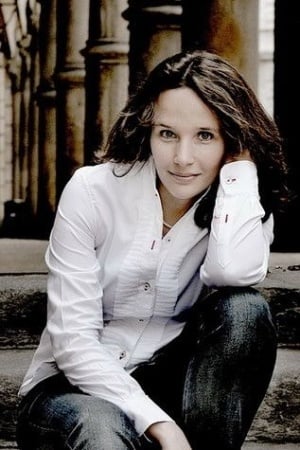Personal Info
Known For Acting
Known Credits 8
Gender Female
Birthday November 7, 1969 (54 years old)
Place of Birth Aix-en-Provence, Bouches-du-Rhône, France
Also Known As
- -
Content Score
100
Yes! Looking good!
Login to report an issue
Biography
Hélène Rose Paule Grimaud (born 7 November 1969) is a French classical pianist and the founder of the Wolf Conservation Center in South Salem, New York.
Grimaud was born in Aix-en-Provence, France. She described family nationalities in a New York Times interview with John Rockwell: "My father came from a background of Sephardi Jews in Africa, and my mother's ancestors were Jewish Berbers from Corsica." Her father was adopted as a child by a French family and he became a university tutor teaching languages. According to Luc Antonini the name Grimaud is typical of the region of Trets in Provence. She discovered the piano at seven. In 1982, she entered the Conservatoire de Paris, where she studied with Jacques Rouvier. In 1985, she won 1st Prize at the Conservatory and the Grand Prix du Disque of the Académie Charles Cros for her recording of the Rachmaninoff Piano Sonata No. 2.
She experiences synesthesia, where one physical sense adds to another, in her case seeing music as colour, which helps her with memorising music scores.
Grimaud has established herself not only as a virtuoso pianist, but also as a committed wildlife conservationist, a compassionate human rights activist and as a writer.
She began her piano studies at the local conservatory with Jacqueline Courtin before going on to work with Pierre Barbizet in Marseille. She was accepted into the Paris Conservatoire at just 13 and won first prize in piano performance a mere three years later. She continued to study with György Sándor and Leon Fleisher until, in 1987, she gave her well-received debut recital in Tokyo. That same year, renowned conductor Daniel Barenboim invited her to perform with the Orchestre de Paris: this marked the launch of Grimaud's musical career, characterised ever since by concerts with most of the world's major orchestras and many celebrated conductors.
Between her debut in 1995 with the Berliner Philharmoniker under Claudio Abbado and her first performance with the New York Philharmonic under Kurt Masur in 1999 – just two of many notable musical milestones – Grimaud made a wholly different kind of debut: in upper New York State, she established the Wolf Conservation Center.
Her love for the endangered species was sparked by a chance encounter with a wolf in northern Florida; this led to her determination to open an environmental education centre. "When you look at a wolf in the eye, you establish a connection," Ms. Grimaud said. "Hearing about wolves and seeing a wolf are two very different things. It’s about accomplishing the goals of outreach — building a bridge of understanding to our counterparts in the wild — and environmental conservation. If you call me an activist, I’m happy." But Grimaud's engagement does not end there: she is also a member of the organisation Musicians for Human Rights, a worldwide network of musicians and people working in the field of music to promote a culture of human rights and social change.
For a number of years, she also found time to pursue a writing career, publishing three books that have appeared in various languages. Her first, Variations Sauvages, appeared in 2003. It was followed in 2005 by Leçons particulières, and in 2013 by Retour à Salem, both semi-autobiographical novels. ...
Source: Article "Hélène Grimaud" from Wikipedia in English, licensed under CC-BY-SA 3.0.
Hélène Rose Paule Grimaud (born 7 November 1969) is a French classical pianist and the founder of the Wolf Conservation Center in South Salem, New York.
Grimaud was born in Aix-en-Provence, France. She described family nationalities in a New York Times interview with John Rockwell: "My father came from a background of Sephardi Jews in Africa, and my mother's ancestors were Jewish Berbers from Corsica." Her father was adopted as a child by a French family and he became a university tutor teaching languages. According to Luc Antonini the name Grimaud is typical of the region of Trets in Provence. She discovered the piano at seven. In 1982, she entered the Conservatoire de Paris, where she studied with Jacques Rouvier. In 1985, she won 1st Prize at the Conservatory and the Grand Prix du Disque of the Académie Charles Cros for her recording of the Rachmaninoff Piano Sonata No. 2.
She experiences synesthesia, where one physical sense adds to another, in her case seeing music as colour, which helps her with memorising music scores.
Grimaud has established herself not only as a virtuoso pianist, but also as a committed wildlife conservationist, a compassionate human rights activist and as a writer.
She began her piano studies at the local conservatory with Jacqueline Courtin before going on to work with Pierre Barbizet in Marseille. She was accepted into the Paris Conservatoire at just 13 and won first prize in piano performance a mere three years later. She continued to study with György Sándor and Leon Fleisher until, in 1987, she gave her well-received debut recital in Tokyo. That same year, renowned conductor Daniel Barenboim invited her to perform with the Orchestre de Paris: this marked the launch of Grimaud's musical career, characterised ever since by concerts with most of the world's major orchestras and many celebrated conductors.
Between her debut in 1995 with the Berliner Philharmoniker under Claudio Abbado and her first performance with the New York Philharmonic under Kurt Masur in 1999 – just two of many notable musical milestones – Grimaud made a wholly different kind of debut: in upper New York State, she established the Wolf Conservation Center.
Her love for the endangered species was sparked by a chance encounter with a wolf in northern Florida; this led to her determination to open an environmental education centre. "When you look at a wolf in the eye, you establish a connection," Ms. Grimaud said. "Hearing about wolves and seeing a wolf are two very different things. It’s about accomplishing the goals of outreach — building a bridge of understanding to our counterparts in the wild — and environmental conservation. If you call me an activist, I’m happy." But Grimaud's engagement does not end there: she is also a member of the organisation Musicians for Human Rights, a worldwide network of musicians and people working in the field of music to promote a culture of human rights and social change.
For a number of years, she also found time to pursue a writing career, publishing three books that have appeared in various languages. Her first, Variations Sauvages, appeared in 2003. It was followed in 2005 by Leçons particulières, and in 2013 by Retour à Salem, both semi-autobiographical novels. ...
Source: Article "Hélène Grimaud" from Wikipedia in English, licensed under CC-BY-SA 3.0.
Acting
|
|||||||||
|
|||||||||
|
|||||||||
|
|||||||||
|
|||||||||
|







